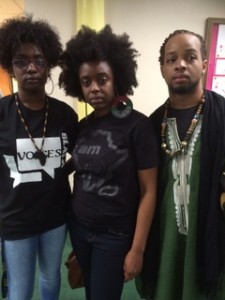
Tavon Cotton, a cousin of Freddie Gray, honors Freddie’s memory. (Photos by Shernay Williams)
Young people peppered the mass of supporters who flooded New Shiloh Baptist Church April 27 to help lay Freddie Gray, the African-American man who recently died in police custody, to rest.
Twenty-somethings, teenagers, and even infants stood in the long lines for seats.
A procession of roughly 25 bikers filed into New Shiloh’s parking lot before the ceremony to serve as a “protective barrier” between outsiders and the Gray family. “We are going to direct traffic and make sure no one cuts through the funeral or intervenes,” said biker Eric Moore, who said he knew Gray. “At the end of the day, it’s about letting the family know they have support. This isn’t just about publicity; this is somebody we saw every day.”
Most of the young mourners wore casual attire, and several donned shirts with printed slogans urging people to “stand for something” and fight for justice.
Tavon Cotton wore a T-shirt with a picture of Gray and the epitaph, “Rest in Paradise.” He said he’s a cousin of the 25-year-old who died one week after suffering a severe spinal cord injury while in police custody this month. “It’s family to me,” Cotton said while standing in a line nearly out of the church doors to view Gray’s body. “I want to pay respects, totally.”
Cotton turned 28 on April 19, the same day Gray died in the hospital. “It’s been downhill for me ever since,” he said. “But I’m trying to think positive…. I just wanted to know what he did…, why he was treated like that.”
That question, which has sparked citywide protests for days, lingered in the back of the minds of many young people at the church. However, most said they attended the funeral—not to demonstrate, but to respect the Gray family.

Young people expressed hope for real change but feel it will only come through consistent protest. (Photos by Shernay Williams)
Lateshia Wallace, 26, did not participate in the protests. “I think it’s more personal to come to a viewing because this could be any Black male,” she said. “I don’t believe protests are effective. We protested in 1965 and there has not been change.”
She said the answer is for Baltimoreans to fight back in “any way,” including politically, economically, and physically. “I’m very militant. I couldn’t protest because I would be in jail,” Wallace added.
Samierra Jones, a 19-year-old student activist at Coppin State University, said when she heard about the Gray case, she was flooded with despair over another Black man losing his life under police watch. She too advocates for the city’s young generation to be aggressive and unapologetic in their quest to end police brutality. “You can compare it to being bullied in school,” Jones said. “You can do nothing and allow it to keep happening or you can fight back and it stops, and that’s with everything in life.”
Others at the funeral say the protests are about solidarity. “I was initially not going to participate in it, but I felt that I couldn’t call myself a man and not go stand with other Black people,” said 21-year-old Shaquille Carbon. “People criticized what happened , but at least the people criticized were in the happenings.”
Parents, including Lakeshia Thomas, attended the services with their children in tow. “I brought my son; I have four boys,” she said. “It hit home. There should be more training of officers. And it needs to be addressed.”

Bikers form an honor guard for Gray’s family. (Photos by Shernay Williams)
Melakah Barber-Bl, a 16-year-old who stood in the funeral line with her mom, said she knows too many people who have been mistreated by police. “I think protesting will make a difference,” she said. “The more people who come out, the more chance they will listen to us and stop.”
The teenager participated in a two-hour-long sit-in during lunch at her high school, the National Academy Foundation.
Cotton reiterated the Gray family’s plea for peaceful protests. “The busting up windows and trashing everything…at the end of day, people have to clean that up,” he said. “I just want an investigation. I’m hoping for change.”
Young leaders of activist organizations greeted those who entered the church. Farajii Muhammad, of the Peace by Piece organization, said groups are joining forces to testify before lawmakers and offer support for families in communities that experience police brutality. “The big thing that came out of this is the great unity that transpired between different people—Christians, Muslims, Bloods, Crips,” Muhammad said. “This is a game-changing moment for Baltimore and we have to take pride. Protests are good, but they have to be the beginning of something that comes after. We need a movement for change.”
He said one of the next steps should be helping the Gilmor community, where Gray was arrested, heal by offering psychological counseling. “We don’t emphasize that enough,” he said. “We go through this over and over again and we are just spiritually broken.”


